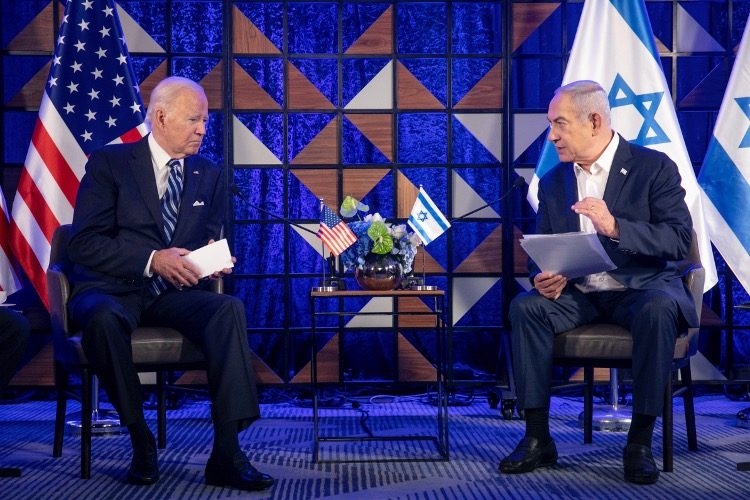
U.S. President Joe Biden has informed his Israeli counterpart Benjamin Netanyahu that the United States would not participate in an Israeli retaliatory campaign against Iran, after Iranian drone and missiles attacked Israel over weekend, based on officials’ testimonies as cited by Reuters.
“You got a win. Take the win,” Biden told Netanyahu on April 13, calling for Israeli restraint to Iran’s moves, as per an unnamed White House official cited by left-wing news outlet Axios.
“I told Prime Minister Netanyahu that Israel demonstrated a remarkable capacity to defend against and defeat even unprecedented attacks — sending a clear message to its foes that they cannot effectively threaten the security of Israel,” Biden said, as cited by Axios.
According to Politico, citing a diplomat acquainted with the matter, U.S. officials have called for Israelis to exercise restraint in their counteroffensive measures against the Iranians, lest Israeli-Iranian face-offs trigger an all-out Middle East war.
For instance, U.S. Secretary of State Antony Blinken and Defense Secretary Lloyd Austin have addressed their counterparts, including those in Saudi Arabia, Türkiye, Egypt, and Jordan on the importance of preventing escalation and a joint diplomatic response. They also underscored that the United States would persist in backing Israel’s defense.
Having said that, it remains to be seen if Netanyahu will take America’s advice about exercising restraint to heart, owing to domestic political pressures.
“Whoever hurts us, we will hurt him,” Netanyahu said following Iran’s strikes over the weekend.
Israeli officials divulged that Netanyahu’s five-member war cabinet voted for retaliation in a meeting on April 14, although members remained divided over the timing and degree of any such response.
Two senior Israeli ministers disclosed that retaliation was not immediate and that Israel would not act alone.
“We will build a regional coalition and exact the price from Iran in the fashion and timing that is right for us,” minister Benny Gantz said, in statements reported by Reuters.
According to Politico, an Israeli official, authorized to speak on the delicate issue, said Israel is “deeply grateful for the steadfast support and commitment from the US, which played a leading role in defending Israel from the Iranian attack,” but maintained that “Israel reserves the right to defend itself following this unprecedented Iranian aggression.”
Also, Israel’s bold move by bombarding and eventually ravaging the Iranian consulate annex building next to the Iranian embassy in Damascus, Syria, on April 1, evidently breaching Syrian sovereignty and the Vienna Convention, was a clear indication that the Netanyahu government was willing to take the risk of escalating Israel’s conflict with Iran and other Middle East actors, with or without U.S. support.
In turn, Iran’s armed forces chief of staff Major General Mohammad Bagheri told state television that “our response will be much larger than tonight’s military action if Israel retaliates against Iran,” elaborating that Tehran warned Washington via Switzerland that any support of Israeli retaliation against Iran would lead to U.S. regional bases being targeted.
“Our operations are over and we have no intention to continue them,” Bagheri proclaimed, before touting that Iran’s attack had successfully hit two Israeli military bases.
Notably, the aforementioned Politico article conceded the stark reality that whatever move Israel eventually adopts next could drastically alter regional dynamics, global energy supplies, and trade routes. Even more so, the U.S. government, with its long track record of overseas military campaigns, could be dragged into Israeli-Arab hostilities once again.
“The Middle East is on the brink. The people of the region are confronting a real danger of a devastating full-scale conflict. Now is the time to defuse and de-escalate,” UN Secretary-General António Guterres told a Security Council meeting on Sunday following Iranian strikes on Israeli territory.
“Neither the region nor the world can afford more war,” Guterres continued, according to The Guardian. Other world leaders echoed Guterres’ call for restraint. However, Deputy U.S. Ambassador to the UN Robert Wood called on the Security Council to unequivocally denounce Iran’s strikes over the weekend.
“Let me be clear: if Iran or its proxies take actions against the United States or further action against Israel, Iran will be held responsible,” he warned.
During the somber and high-stakes UN meeting on April 14, Israel urged for more sanctions on Iran while Iran said its actions were proportionate and cautioned it would attack harder if Israel retaliated.


